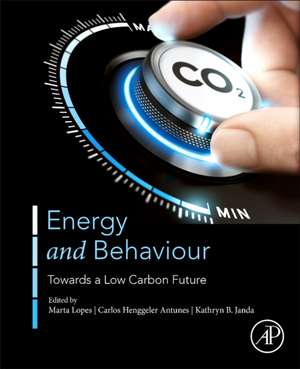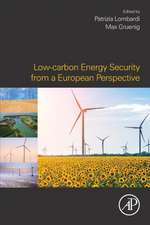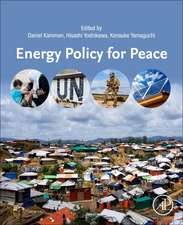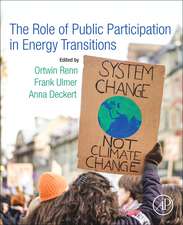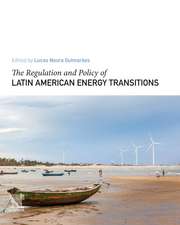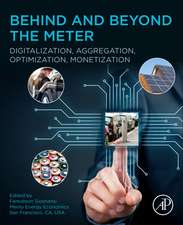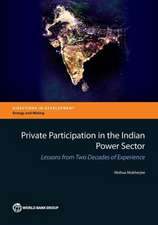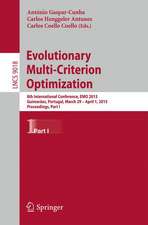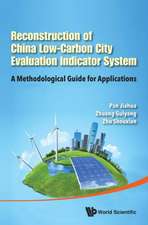Energy and Behaviour: Towards a Low Carbon Future
Editat de Marta Lopes, Carlos Henggeler Antunes, Kathryn B. Jandaen Limba Engleză Paperback – 25 noi 2019
- Introduces the major disciplinary and interdisciplinary approaches to understanding energy and behaviour
- Delivers a cross-sectoral overview including energy behaviour in buildings, industry, transportation, smart grids, and smart cities
- Reviews a selection of innovative energy behaviour modelling approaches, including agent-based modelling, optimization, and decision support
- Critically addresses the importance of interventions, policies, and regulatory design
Preț: 582.28 lei
Preț vechi: 791.44 lei
-26% Nou
Puncte Express: 873
Preț estimativ în valută:
111.42€ • 116.10$ • 92.25£
111.42€ • 116.10$ • 92.25£
Carte tipărită la comandă
Livrare economică 27 martie-10 aprilie
Preluare comenzi: 021 569.72.76
Specificații
ISBN-13: 9780128185674
ISBN-10: 0128185678
Pagini: 558
Ilustrații: 34 illustrations
Dimensiuni: 191 x 235 x 28 mm
Greutate: 0.95 kg
Editura: ELSEVIER SCIENCE
ISBN-10: 0128185678
Pagini: 558
Ilustrații: 34 illustrations
Dimensiuni: 191 x 235 x 28 mm
Greutate: 0.95 kg
Editura: ELSEVIER SCIENCE
Cuprins
1. Energy and behaviour: Challenges of a low-carbon future
PART 1: Understanding energy behaviour: Disciplinary approaches and beyond
1.1 Psychology and energy conservation: Contributions from theory and practice
1.2 Behavioural economics for energy and climate change policies and the transition to a sustainable energy use - A Scandinavian perspective
1.3 Beyond energy behaviour: A broader way to see people for climate change technology planning
Part 2: Energy behaviour across sectors
2.1 Resource-efficient nondomestic buildings: Intertwining behaviours and technology
2.2 The challenge of improving energy efficiency in the building sector: Taking an in-depth look at decision-making on investments in energy-efficient refurbishments
2.3 Reframing energy efficiency in industry: A discussion of definitions, rationales and management practices
2.4 What do we know about the role the human dimension plays in shaping a sustainable low-carbon transport transition?
2.5 The impact of the institutional context on the potential contribution of new business models to democratizing the energy system
2.6 Energy, human activity, and knowledge: Addressing smart city challenges
PART 3 - Modelling energy behaviour
3.1 Energy and enjoyment: The value of household electricity consumption
3.2 Developing quantitative insights on building occupant behaviour: Supporting modelling tools and datasets
3.3 Agent-based modelling of the social dynamics of energy end use
3.4 Preference elicitation approaches for energy decisions
PART 4 - Promoting behaviour change
4.1 A critical review of energy behaviour change: The influence of context.
4.2 Urban low-carbon futures: Results from real-world lab experiment in Berlin
4.3 Overview of the European Union policies to promote more sustainable behaviours in energy end-users
4.4. A brief history of behaviour in US energy programs: Landscape, integration, and future opportunities
PART 1: Understanding energy behaviour: Disciplinary approaches and beyond
1.1 Psychology and energy conservation: Contributions from theory and practice
1.2 Behavioural economics for energy and climate change policies and the transition to a sustainable energy use - A Scandinavian perspective
1.3 Beyond energy behaviour: A broader way to see people for climate change technology planning
Part 2: Energy behaviour across sectors
2.1 Resource-efficient nondomestic buildings: Intertwining behaviours and technology
2.2 The challenge of improving energy efficiency in the building sector: Taking an in-depth look at decision-making on investments in energy-efficient refurbishments
2.3 Reframing energy efficiency in industry: A discussion of definitions, rationales and management practices
2.4 What do we know about the role the human dimension plays in shaping a sustainable low-carbon transport transition?
2.5 The impact of the institutional context on the potential contribution of new business models to democratizing the energy system
2.6 Energy, human activity, and knowledge: Addressing smart city challenges
PART 3 - Modelling energy behaviour
3.1 Energy and enjoyment: The value of household electricity consumption
3.2 Developing quantitative insights on building occupant behaviour: Supporting modelling tools and datasets
3.3 Agent-based modelling of the social dynamics of energy end use
3.4 Preference elicitation approaches for energy decisions
PART 4 - Promoting behaviour change
4.1 A critical review of energy behaviour change: The influence of context.
4.2 Urban low-carbon futures: Results from real-world lab experiment in Berlin
4.3 Overview of the European Union policies to promote more sustainable behaviours in energy end-users
4.4. A brief history of behaviour in US energy programs: Landscape, integration, and future opportunities
